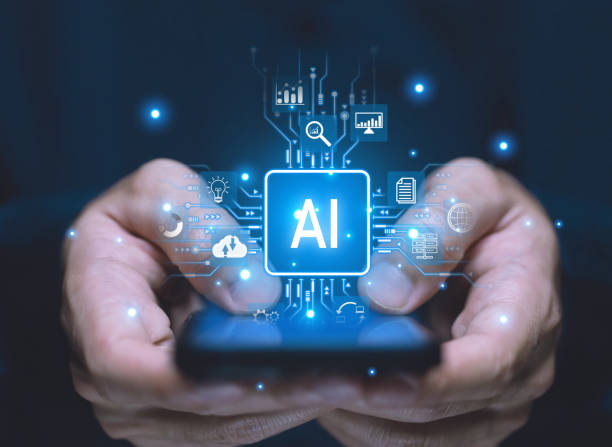An Introduction to Mobile AI Applications and Their Impact

In today’s fast-paced world, #technology and #artificial_intelligence are rapidly permeating various aspects of our lives.
One of the most prominent manifestations of this penetration is the unprecedented emergence and development of mobile AI applications.
These powerful tools bring AI capabilities directly to our smartphones and tablets, creating a profound transformation in how we interact with technology and even with ourselves.
From smart voice assistants to sophisticated photo editing tools and real-time translators, we witness new innovations in this field every day.
The goal of this article is to provide a comprehensive and explanatory overview of these applications, their functionality, and the widespread impacts they have on our daily lives.
The integration of AI into the mobile sector has not only increased our productivity but also provided entirely new user experiences.
These applications can automate repetitive tasks, offer new insights, and even assist us in complex decision-making.
Are you tired of your company’s website not meeting your expectations? With RasaWeb, design a professional website that truly represents your business.
✅ Increase acquisition of new customers and sales leads
✅ Enhance your brand’s credibility and trust among your audience
⚡ Get a free website design consultation!
How Mobile AI Applications Work
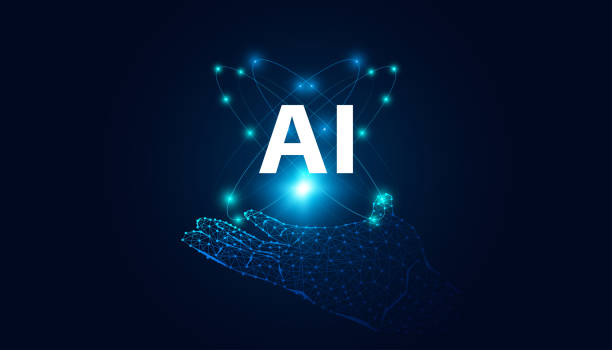
How do mobile AI software applications work? The core of these applications is based on Machine Learning and Deep Learning algorithms.
These algorithms allow the application to learn from data, identify patterns, and make predictions.
For example, an image recognition application processes millions of photos to learn to identify objects, faces, or scenes.
This processing can be done locally on the device (On-device AI) or by sending data to cloud servers (Cloud AI).
The advantage of on-device AI is higher speed and greater privacy, while cloud AI has access to more processing power and can perform more complex tasks.
Many of today’s mobile AI applications use a combination of these two approaches to provide the best performance and user experience.
Understanding these technical mechanisms helps us better grasp the true potential of these tools.
This specialized approach allows us to delve beyond the application’s appearance into its technological essence.
Broad Benefits and Applications of Mobile AI Applications

The benefits of using mobile AI applications are very broad and diverse.
From increasing personal productivity to improving quality of life, these tools have proven useful in various fields.
For example, in education, there are applications that use AI to personalize learning methods based on students’ individual needs and deliver educational content in an #interactive and #entertaining way.
In the health sector, we see applications that analyze health data to help users manage illnesses or maintain a healthy lifestyle.
Additionally, photo and video editing applications with face detection capabilities, automatic image enhancement, and one-click artistic effects offer an unparalleled user experience.
| Category | Example Mobile AI Application | Main Benefit |
|---|---|---|
| Voice Assistants | Siri, Google Assistant | Task automation, voice access to information |
| Image and Video Editing | FaceApp, Lensa | Automatic enhancement, creation of artistic effects |
| Health and Fitness | MyFitnessPal (with smart features) | Health data analysis, personalized recommendations |
| Language Translation | Google Translate | Instant text and voice translation |
This is just a fraction of the countless applications of AI-powered mobile applications, and with technological advancements, we will certainly see their expansion into new areas.
Each of these applications, in its own way, makes our lives simpler, smarter, and sometimes more entertaining.
This comprehensive guide helps users become familiar with the full potential of these applications.
Different Categories of Mobile AI Tools
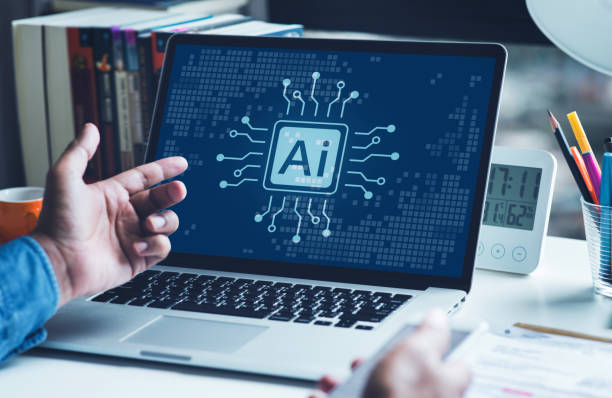
Mobile AI tools can be divided into several main categories based on their functionality to provide a better understanding of their diversity and breadth.
The first category includes virtual and voice assistants like Siri and Google Assistant, which allow users to control their devices with voice commands, search for information, and perform various tasks.
The second category consists of productivity enhancement applications, including tools for task organization, smart note-taking, time management, and even SEO.
The third category encompasses entertainment and creativity applications, which include advanced image and video editing tools, augmented reality (AR) filters, and AI-driven games.
These applications often utilize deep learning capabilities to create stunning visual content.
The fourth category relates to health and fitness, providing personalized recommendations for improving physical and mental well-being by analyzing wearable data and user input.
This educational categorization helps users better identify their needs and find suitable mobile AI applications.
Does your company’s website perform as befits your brand? In today’s competitive world, your website is your most important online tool. RasaWeb, a specialist in professional corporate website design, helps you to:
✅ Attract customer credibility and trust
✅ Convert website visitors into customers
⚡ Get a free consultation!
Challenges and Limitations of Smart Mobile Applications
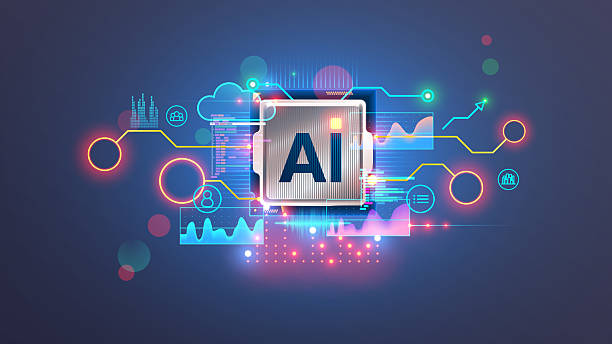
Despite significant advancements, smart mobile applications also face challenges and limitations that require attention and appropriate solutions.
One of the main limitations is the processing power and battery capacity of mobile devices.
Running complex AI algorithms can significantly increase battery consumption and cause the device to overheat.
Another challenge is data privacy.
Many mobile AI applications require access to a large volume of personal data for optimal performance, which can raise concerns about the security and misuse of this information.
Furthermore, the accuracy and reliability of AI are always debated; AI systems may make errors or provide unexpected results in specific situations, requiring continuous monitoring and correction.
Dependence on an internet connection for some of these applications can also be a challenge in areas with limited network access.
Analyzing these limitations is crucial for developers and users to have realistic expectations of this technology and find appropriate solutions to overcome them.
Future Trends and Predictions for AI Technologies in Mobile

The future of AI technologies in mobile appears very bright and exciting.
It is predicted that the integration of AI with #Internet_of_Things (IoT) and Augmented Reality (AR) in mobile devices will expand, creating novel user experiences.
We will witness the emergence of much more advanced virtual assistants that are not only capable of responding to simple commands but can also understand conversational contexts and offer proactive suggestions.
On-device AI will also become more powerful with advancements in mobile hardware, enabling more complex processing without the constant need for cloud connection.
This is especially important for privacy and offline functionality.
Furthermore, mobile AI applications are expected to play a more prominent role in specialized fields such as remote medical diagnosis, personalized education, and smart financial management.
These trends will not only increase efficiency and productivity but will also fundamentally change the way we live and work.
This informative and analytical outlook on the future prepares us for adopting and utilizing forthcoming innovations.
Guide for Choosing and Optimizing Use of Smart Mobile Solutions

Choosing the best smart mobile solutions from the plethora of available applications can be challenging.
The first step is to identify your needs.
Are you looking to increase productivity, or do you want a tool for entertainment and creativity? After that, look for applications that have a good reputation in the market and have received positive user reviews.
Be sure to pay attention to the access permissions the application requests to ensure the security of your personal information.
Some mobile AI applications offer free versions with limited features and premium (paid) versions with more comprehensive functionalities; it’s better to try the free version first.
Regular updates of applications are also important, as updates usually include performance improvements, bug fixes, and the addition of new features.
Also, use your device’s privacy and security settings to better control application access.
| Consideration | Explanation |
|---|---|
| Personal Needs Assessment | Specify what problem you want to solve or what feature you need. |
| Reviewing Reviews and Ratings | Before installing, read other user reviews in app stores. |
| Checking Permissions | Ensure the application only accesses essential information. |
| Comparing Features and Price | Compare free and paid versions. |
By following these guidelines, you can fully leverage the potential of AI applications on smartphones and have a secure and useful experience.
These recommendations help you make the best decision for yourself.
Ethical and Privacy Issues in Portable AI Applications

As portable AI applications become more integrated into our lives, issues related to ethics and privacy gain greater importance.
One of the most significant concerns is the collection and use of personal data.
Many of these applications collect large amounts of user information, including location, usage habits, and even sensitive health data, to improve their performance.
The question is how this data is protected and whether companies use it for purposes other than service improvement. Transparency regarding privacy policies and providing users with more control over managing their data are of paramount importance.
Another challenge is #bias in AI algorithms.
If the training data for algorithms is biased, the results from the AI can also be unfair or discriminatory.
This can be particularly problematic in areas such as employment or loan granting.
This thought-provoking content compels us to consider the deeper impacts of technology on society and individuals, beyond its superficial appearance, and to seek ethical and responsible solutions.
Discussion about these issues is vital for ensuring the responsible development and use of mobile AI applications.
Falling behind in competition with large online stores?
RasaWeb, by designing professional e-commerce websites, brings your business online and increases your market share!
✅ Enhance brand credibility and customer trust
✅ Easy shopping experience leading to more sales
⚡ Act now to get a free website design consultation!
Developing Mobile AI Applications: Tips for Developers
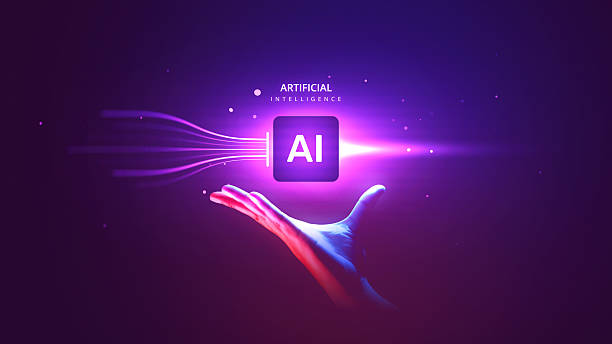
Developing mobile AI applications is a specialized and growing field that requires deep knowledge in machine learning and mobile programming.
Developers must be familiar with specialized frameworks and libraries such as TensorFlow Lite or Core ML, which allow for the optimized deployment of AI models on mobile devices.
Optimizing performance and resource consumption is one of the main challenges in developing these applications, as processing and memory resources on mobile devices are limited.
User Interface (UI) and User Experience (UX) design also hold special importance in these types of applications; users expect interaction with AI to be natural and intuitive.
Furthermore, attention to data privacy and security issues is very important from the early stages of design and development.
Using cloud architectures for heavy AI processing and combining it with on-device AI for faster responsiveness is a common approach.
To succeed in this field, developers must continuously update their knowledge and keep pace with the latest advancements in AI and mobile technology.
This specialized approach to development helps create efficient and user-friendly mobile AI applications.
The Impact of The Power of AI in Your Hands on Daily Life

The power of AI in your hands, through mobile AI applications, has impacted our daily lives in numerous ways.
From changing how we communicate with friends and family through AI improvements in messaging platforms, to assisting us in travel planning with personalized suggestions for flights and accommodations.
These tools even help us with small and repetitive tasks like replying to emails or managing calendars, freeing up more time for more important activities.
Their impact on education, health, entertainment, and even the financial sector is also evident.
Banking applications using AI analyze our spending patterns and provide savings suggestions.
In education, smart learning platforms with adaptive content completely personalize the learning experience.
This widespread and continuous penetration shows that AI is no longer a science fiction concept but an inseparable part of our modern life’s reality.
This analysis demonstrates how Artificial Intelligence in mobile devices plays a pivotal role in facilitating and enriching our daily experiences.
Frequently Asked Questions
| Number | Question | Answer |
|---|---|---|
| 1 | What is a mobile AI application? | A mobile AI application is a program that uses AI capabilities (such as machine learning, natural language processing, computer vision) to provide smarter and more automated experiences on mobile devices. |
| 2 | Why is AI important in mobile applications? | Its importance is due to increased efficiency, personalization of user experience, task automation, improved decision-making, and providing innovative capabilities such as facial recognition or voice assistants. |
| 3 | What are some examples of mobile applications with AI? | Voice assistants (such as Siri, Google Assistant), navigation apps with real-time traffic (Google Maps), image filters (Snapchat, Instagram), language translation apps, and facial recognition applications. |
| 4 | What challenges exist in developing mobile AI applications? | Hardware limitations of mobile devices (processing power, battery), the need for large and high-quality data, user privacy protection, and the complexity of implementing AI models. |
| 5 | What is the role of machine learning in these applications? | Machine learning allows the application to learn from data, identify patterns, and improve its performance over time, such as product recommendation systems or speech recognition. |
| 6 | Do mobile AI applications require an internet connection? | Many advanced AI capabilities require an internet connection and cloud processing, but some lighter models can also work “on-device” (without internet). |
| 7 | How does AI help improve user experience on mobile? | By personalizing content, predicting user needs, automating repetitive tasks, and providing more natural user interfaces such as voice commands. |
| 8 | What is the difference between cloud AI and on-device AI in mobile? | Cloud AI uses powerful servers for processing (requires internet), while on-device AI performs processing directly on the phone itself (without internet, but with processing limitations). |
| 9 | What will be the future of mobile AI applications? | We expect to see increased personalization capabilities, deeper integration with phone sensors, development of smarter assistants, and advancements in on-device processing. |
| 10 | Which frameworks are popular for AI development in mobile? | TensorFlow Lite (for Android and iOS), Core ML (for iOS), PyTorch Mobile are among the popular frameworks for implementing AI models in mobile applications. |
And other advertising services of RasaWeb Advertising Agency:
Smart UI/UX: A creative platform to improve campaign management with precise audience targeting.
Smart SEO: Revolutionize user interaction by utilizing real data.
Smart Google Ads: An effective tool to increase website traffic with custom programming.
Smart Website Development: A creative platform to improve sales growth with intelligent data analysis.
Smart Direct Marketing: A quick and efficient solution for user engagement focusing on SEO-driven content strategy.
And over a hundred more services in online advertising, advertising consultation, and organizational solutions.
Online Advertising | Advertising Strategy | Advertorials
Sources
Review of the Best Mobile AI Applications
The Future of Mobile AI Applications in Iran
The Role of AI in Smartphone Evolution
Exploring Mobile AI Technologies
? With RasaWeb Afarin, your business takes flight in the digital world! We offer innovative and results-driven solutions for your growth with comprehensive services including responsive website design, SEO, and content marketing.
📍 Tehran, Mirdamad Street, next to Bank Markazi, Kazeroun South Alley, Ramin Alley, No. 6


